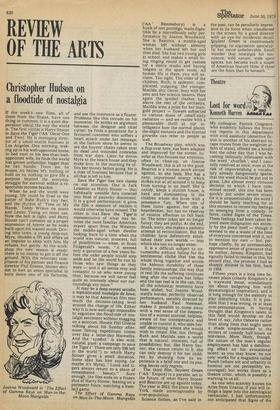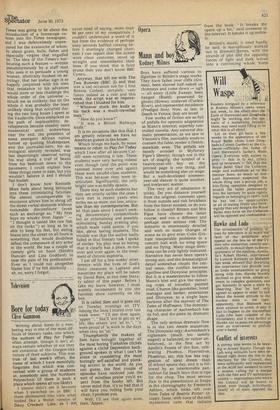Theatre
Lost for word
'Kenneth Hun-en
My colleague, Patrick Cosgrave, who evidently follows the frivolous reports in this department with avid assiduity (detective fiction is another of his aberrant escape routes from the weightier affairs of state), offered me a kindly hint the other day that I was becoming tediously infatuated with the word ' churlish '; and I naturally resolved at once, even at the risk of impoverishing a vocabu lary already dangerously sparse, that the word should be put out to grass. Like almost every virtuous decision to which I have com mitted myself, this one has been quickly put under severe strain, for it is unquestionably the word I should be lazily reaching for at this moment to record my feelings on emerging from a comedy, or
farce, called Signs of the Times.
These feelings had been taken beyond mere indignation not entire ly by the piece itself — though it seemed to me a waste of the time of everyone concerned with it, not to mention my own — but, per haps chiefly, by an unreasonably oppressive sense of grievance that its author, Jeremy Kingston, had signally failed to realise in this, his second play, the promise I had so sharply divined in his first, back in 1958.
Fifteen years is a long time between plays (clearly Kingston's is a wayward muse, scandalously lax about badgering him with dramaturgical inspiration), and it is long enough for the memory to play disturbing tricks. It is possible that I was wrong, or at least over-presumptuous, in having thought that Kingston's talent in this field would develop on the level of, say, John Osborne rather than along lines that might seem a shade simple-minded to the writers of comedy half-hours on television. More likely, though, the nature of the man's regular employment has had a debilitat ing effect on his avocational talent: as you may know, he not only works for a magazine called Punch (where wit and urbanity in humour are not perceptibly en couraged) but works there as a theatre critic, which is possibly a warning to us all.
As one who scarcely knows his Aries from Uranus, if you will in
dulge a lapse into the astrological vernacular, I had unfortunately not anticipated that Signs of the
Times was going to be about the introduction of a horoscope column into the Times newspaper, and I was defencelessly unpre pared for the avalanche of whimsy about goats, bulls, fishes and especially virgins that engulfed
us. The idea of the Times's harbouring such a feature — written pseudonymously by a staff man who uses it to persuade a young woman, idiotically hooked on astrology, that her zodiac sign is so happily conjoined with his own that resistance to his advances would more or less challenge the whole order of the universe — struck me as unlikely; but on the whole it was probably the least unlikely thing that occurred during the two long hours I spent at the Vaudeville. Once embarked on the path of implausibility, developments became steadily more nonsensical until, somewhere near the end, the president of some emergent African nation turned up quoting Shakespeare, and the journalist-hero, his astrological identity revealed, was last dispiritingly observed eating his way along a trail of beans from his bedroom down to the pavement. I could explain how these things came to pass, but you wouldn't believe it and I should feel foolish.
I don't know how Kenneth More feels about being betrayed into these intimidating fatuities. . His almost unconquerable insouciance allows him to shrug off the direst verbal demands without noticeable discomfiture (even such an exchange as, "My firm buys its whisky from Japan " — "I thought it tasted like raw fish
on the rocks ") so long as he is able to keep his feet, but eating beans into the street on all fours is something that would doubtless defeat the composure of any actor in the world. He has a couple of comely girls on hand (Sandra Duncan and Liza Goddard) to ease the pain of his predicament. Even so I could not altogether blame him if he felt distinctly . . . ah, no, sorry I forgot.
_



































 Previous page
Previous page